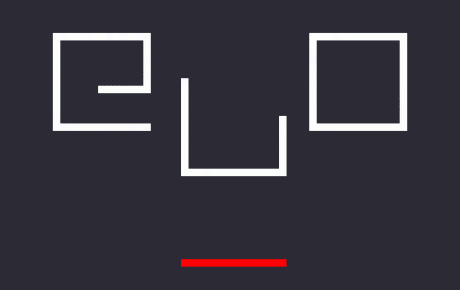"Je veux" is a collection of poems written in 1997/1998 directly accessible through the authors' website by clicking "Being Human 1997/1998". Access to the text is through a menu offering a choice between "Je veux" , "tendresse easy easy", "a kiss" and "more". In the three poems the reader/visitor is invited to click on either "tu" or "you". The narrator's voice appears in the forms of "Je", "me" as well as in expressing his/her desire in "je voudrais".
In the poem "a kiss", the visitor "engages" with the narrator when s/he encounters a dialogue box and is asked to enter his/her name - the narrator only kisses people whose name s/he knows. The visitor then has to confirm if he or she wants a computer kiss. There are four different languages: German, English, French and Dutch. If the visitor responds in the affirmative in a language, oui, ja or yes, the screen is emblazoned with monochrome flashes of orange, red, pink resembling lipstick kisses. There is also a sentence in the middle of the screen saying how many times the narrator has kissed, reminiscent of the number of visitors to a website. The visitor returns to the menu and finds it changed. S/he now finds "a kiss" replaced with "we could meet again?" This new link brings the visitor to an error page. The question remains as to whether this is intentional or a reminder of the ephemeral character of electronic literature.
If the visitor responds "no", another scenario is launched. The narrator asks for the visitor's name, and reveals the number of times s/he has kissed up to that point. The moment the visitor responds "no", s/he is left with the return response of "Then, I will leave you" as well as the "threat" of the closing of the window. The window closes automatically after a few seconds and the visitor is out of the website completely. There is a possibility to keep the window open, which mirrors an ultimatum in a real relationship - underneath "Then I will leave you!" which is presented in bold letters, in fine print is "If you don't want the window to close click here". The program playfully mimics a relationship. The personalized reaction of the program to the visitor's answer suggests artificial intelligence.
In the poem "je veux", the words "tu", "me" and "respectes" in white appear on a black background. These form to read "je veux que tu me respectes" (I want you to respect me); "you are loved", "you loved me". Some words are underlined in the poem, and if those words are clicked, they freeze. After clicking several more times on different words, the visitor is returned to the initial menu.
In the poem "tendresse", rectangles and squares form across the screen in different colors. Seven screens follow in succession in different colors and containing different words for each. The words appear in English, French, Dutch and in German. The seven screens represent the seven days of the week, and those words are written in English and in French moving from top to bottom of the screen. The days of the week are associated with emotions and feelings and also have different sounds for each one. This collection of poems blends visual, plastic and textual art, and animated poetry shows how well this relationship works.
(Source: Iona Wynter Parks)
Je veux
Source Database:
ELMCIP
Source Entry URL:
Source Entry OAI-PMH Identifier:
oai:elmcip.net:9742
Source Entry Language(s):
English
Description(s):







